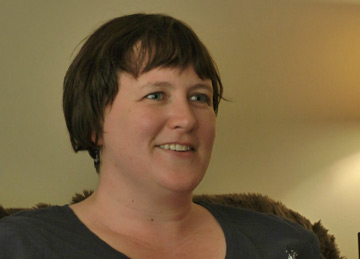Claire

Cares for her husband
Age at interview: 37
Age at start of caregiving: 30
Claire is 37 years old and lives with her husband who is 39 years old and has duchenne muscular dystrophy. She is his primary caregiver although they have help from several paid caregivers during the day. Claire works full-time as a social worker.
Claire and her husband met online in 2004 and married two years later. At the time they met, he had been in a power wheelchair since he was 11 years old and required 24/7 help for all activities of daily living, although he continues to be cognitively independent.
Claire explains that her experience as a caregiver is somewhat different from others’ in that she entered the relationship and fell in love when her husband was already using a wheelchair. Becoming a caregiver didn’t just ‘happen’ to her unexpectedly as per the usual scenario – she chose this relationship and all of its implications from the start. Given that he had several caregivers already in his life, Claire tried to focus more on the relationship, although she does assume several caregiving responsibilities in part to protect their privacy at home (they have chosen not to have live-in caregivers).
With a daily routine that involves several caregivers at different times of day, Claire is able to maintain her job outside the home; her husband also goes to work in the afternoons with the support of a caregiver, and they return home about the same time. Claire’s husband needs assistance to get in and out of bed, for feeding and all personal care, and to manage transportation. He uses a ventilator at night. Claire speaks about the challenge of balancing the need for privacy and the need for help; some activities such as plane travel have finally proven too difficult and dangerous for the effort. She is, however, quick to mention the enormous privilege her situation has provided her in terms of appreciating the world through a disabled person’s eyes, and as a couple with a disabled partner. She identifies inaccessibility as their biggest challenge – as an example, they can only get into about 10% of their friends’ homes, but also mentions their van as their most valued possession for freedom!
Claire and her husband’s experiences with the formal healthcare system have been relatively positive and Claire feels that her role is acknowledged by healthcare professionals. They are in a somewhat unique position to educate physicians about the progress of this medical condition and his needs over time as he has already lived much longer than originally expected. This has been attributed in part to the ventilation therapy he uses as part of his usual regimen.
Claire’s advice to friends and family includes the need to think about pragmatic ways to include them as partners in simple events such as dinner parties, finding a few hours here and there to come over to help out or visit, and not being afraid to ask how they can help.
Her advice to policy makers would be to consider accessibility issues more thoroughly.
More content
- Trying to find the right balance – ClaireClaire and Luke are good at strategizing; they always try to find new ways to make their lives more relaxed.
- Travelling, holidays and respite – ClaireAirplanes are not adequately accessible, so Claire and her husband stopped using air travel.
- Social impact and lifestyle changes – ClaireClaire and Luke are not always able to attend get-togethers with family and friends because their homes are not accessible.
- Advice for professionals and society 2 – ClaireClaire believes that policies and practice regarding financial and other support for caregivers must be flexible from person to person.
- Advice for professionals and society – ClaireClaire suggests that health professionals ask for the caregivers’ perspective. Some care decisions may impact their lives in ways you may not realize.
- Advice for friends and family – ClaireTry to find an alternative solution if it is not possible for the care recipient come over. Claire recommends having a meal somewhere else, or making dinner yourself and bringing it over.
- Becoming a caregiver – ClaireClaire and Luke got married two years after meeting online. Claire learned of Luke’s disability before meeting him in person